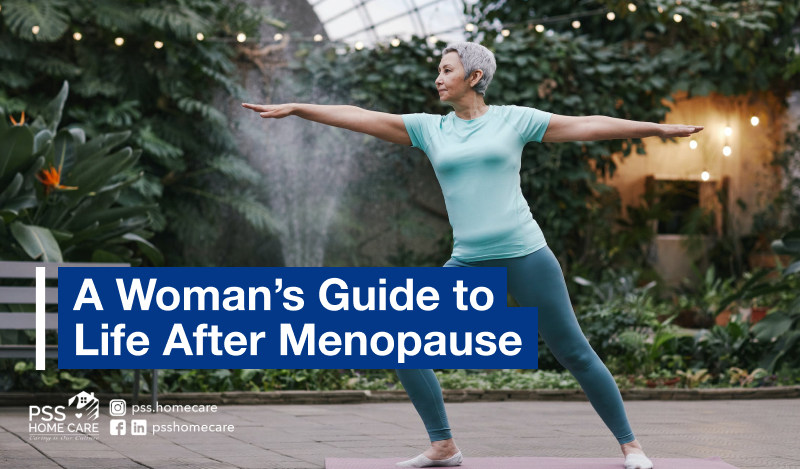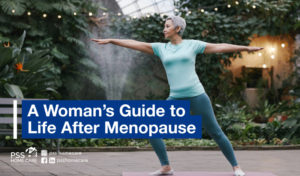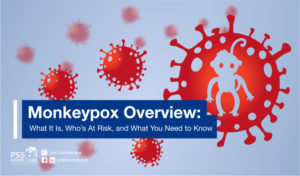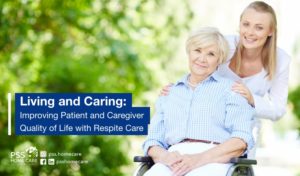A Woman’s Guide to Life After Menopause Menopause, which occurs...
Read More
- Neil Reyes
- May 17, 2023
- 19 Comments
A Woman’s Guide to Life After Menopause

Menopause, which occurs when a woman’s menstrual cycle stops after a 12-month period, can happen when a person reaches 40 or 50 years of age. On average, women in the United States experience menopause at 52 years of age. However, it’s possible for women to have premature menopause, or menopause that occurs before the age of 40, if they have had their uterus and/or ovaries surgically removed, have autoimmune disorders, or a history of smoking, among others.
What are menopause symptoms?
Though menopause is a natural part of biological aging, many women are not aware of how it is diagnosed or of its symptoms. According to Bonafide’s “State of Menopause Study,” 29% of women “never sought information about menopause before they experienced it.” 34% of women who took part in this study are experiencing menopause symptoms but are currently undiagnosed, while 20% of women have experienced menopause symptoms for more than a year before being formally diagnosed.
During perimenopause, or the period preceding menopause, women will typically experience some, many, or all of following menopause signs and symptoms:
Irregular periods
Your flow might become lighter or light some days, and heavy on others. You might also skip periods.
Vaginal dryness
This may be due to lower estrogen levels, which is a hormone responsible for the vagina’s lubrication, elasticity, and thickness.
Hot flashes
This includes a sudden feeling of warmth that spreads through your chest, neck, and face, a rapid heartbeat, perspiration, and feelings of anxiety. This can last for one to five minutes.
Mood changes
Because of hormonal changes, you might experience feelings of anger and sadness. You might also have trouble concentrating, feel anxious, or fatigued.
Weight gain
Hormonal changes can also affect your metabolism and cause you to gain weight especially in your abdomen, hips, and thighs.
Thinning hair and dry skin
When estrogen and progesterone levels decrease, you might experience thinning hair and dry, thin skin.
Talk to your doctor if you’re experiencing any or all of the previously mentioned signs and symptoms.
Can menopause symptoms be treated?
Although menopause has no medical treatment, there are available treatments that can help alleviate certain menopause symptoms.
Take note that different women require different forms of treatment. You should work with your doctor to know what kind of treatment would work best for you, and make sure that you review your treatment options regularly if not yearly.
The following are common treatments for menopause symptoms:
- Low-dose hormonal birth control. During perimenopause, you might sometimes experience irregular periods and even heavier flow. Birth control pills can help regulate periods and lessen menstrual flow. However, it should be noted that hormonal birth control should not be taken by women who smoke, as it increases the risk of cardiovascular diseases in women aged 35 and above.
- Vaginal moisturizers and lubricants. To relieve itchiness, dryness, pain (especially during intercourse), and reduce the risk of vaginal infection, you can apply vaginal moisturizers every few days and vaginal lubricants during sexual activity.
- Hormone therapy (HT). This is used to increase hormone levels (estrogen or a combination of estrogen and progestin, also referred to as EPT) to help relieve some menopausal symptoms, such as hot flashes, vaginal dryness, and itchy skin. It can also decrease the chances of developing osteoporosis, colon cancer, diabetes, and joint pain. It can improve mood and mental well-being, too. However, HT also comes with certain risks, including an increased chance of developing endometrial cancer, gallstones, breast cancer, and blood clots. Women who have had a history of cancer or have abnormal bleeding, among others, should not have HT.
- Non-HT medications such as Gabapentin and Clonidine. These medications can help relieve hot flashes and night sweats in women who can’t or choose not to go for HT.
Are there lifestyle changes that women can do to alleviate menopause symptoms?
The following are some important lifestyle changes that women can do to relieve menopause symptoms that do not require medication:
- Go for healthier food options. Limit your consumption of processed foods and go for a diet rich in healthy fats, protein, dairy, fruits and vegetables, and fiber.
- Avoid alcohol, too much caffeine, and spicy foods. These can make hot flashes and night sweats feel worse.
- Incorporate strength-training, aerobics, stability, balance, and flexibility exercises in your daily living. Regularly exercising can help you relieve stress and maintain a healthy weight. Research shows that obese women experience hot flashes more frequently than thinner women, thus, maintaining a healthy weight can help alleviate hot flashes and night sweats in menopausal and postmenopausal women.
- Dress in light, layered clothing. In doing so, when you experience a hot flash, you can easily remove articles of clothing and put them back on at a later time.
Caring is our Culture
At PSS Home Care, we provide top-notch respite care and home care to older adults, as well as people living with disabilities, chronic illnesses, or cognitive impairments. Our home health aides help our clients with activities of daily living such as bathing, dressing, and grooming, among many others. They also prepare healthy meals and oversee the administration of prescribed medication. These and more are what make PSS Home Care’s brand of compassionate care exceptional.
For more information about our home care services, contact us at 718-752-9833. We’d be glad to discuss possible care options that best suit your loved ones’ needs today.
Check out our other articles
Monkeypox Overview: What It Is, Who’s At Risk, and What You Need to Know
Monkeypox Overview:What It Is, Who’s At Risk, and What You...
Read MoreLiving and Caring: Improving Patient and Caregiver Quality of Life with Respite Care
Living and Caring: Improving Patient and Caregiver Quality of Life...
Read MoreHappy Lives with HHAs: How to Help the Elderly with Loneliness
Happy Lives with HHAs: How to Help the Elderly with...
Read More




Ваша идея великолепна
во втором случае Джон вспоминает событие одно время, которое уже нельзя изменить, [url=https://psisvet.eu/2025/04/29/spb-kupit-diplom-kolledzha-cena-4/]https://psisvet.eu/2025/04/29/spb-kupit-diplom-kolledzha-cena-4/[/url] и использует third conditional.
Извините, ничем не могу помочь. Но уверен, что Вы найдёте правильное решение.
join our ranks at institution Silverton, where dice always remains on the crest of the wave, [url=https://softcenter.bi/2025/04/18/the-best-mobile-casino-apps-for-2025-4/]https://softcenter.bi/2025/04/18/the-best-mobile-casino-apps-for-2025-4/[/url] and fun never does not stop . intend learn flip craps?
По моему мнению Вы не правы. Я уверен. Могу отстоять свою позицию.
Cons: withdrawal of finances may take several days. take a look at the best online casinos for real money, in order resort to amazing games, large bonuses, reliable banking services, [url=https://majorisenergy.com.br/2025/04/18/vivi-provides-the-ultimate-betting-experience-with-18/]https://majorisenergy.com.br/2025/04/18/vivi-provides-the-ultimate-betting-experience-with-18/[/url] and other bonuses.
ラブドール 激安Nu,Augengeradeaus,
but they are in fact completely different descriptors.Silk is a fiber,sexy velma cosplay
bu ihtiyac? kars?lamak talebi/bu ihtiyac? kars?lamak icin parabet, [url=https://arsivplak.com/]TR Parabet[/url] yerel dizinime bunun icin tasarlanm?s crash games bolumunu ekledim. Tabii ki, meyveli, tarihi, mitolojik, hayvanlar ve/ve ayr?ca spor temalar?na sahip slotlar /tek kollu haydutlar sizi sas?rtacak /sas?rtacak}!
black,ivory,velma cosplay sexy
and grommets with lacing strings up the back,allowing a much more dramatic change to the shape of your entire torso.sexy velma cosplay
Ну это ты точно зря.
data games are absolutely popular in Vegas, as are [url=https://www.hkstarharbour.com/casino-goldenpanda/exploring-the-thrills-of-golden-panda-casino-2]https://www.hkstarharbour.com/casino-goldenpanda/exploring-the-thrills-of-golden-panda-casino-2[/url], and in addition such predecessors as quick hit and double diamond.
Согласен, это забавное сообщение
sie {wollen|wollen/wollen/wollen/wollen} kurz und kompakt|dicht} Ihr Angebot {Angebot} {Sortiment} {Produkte|Speisen und Getranke} auf {einer|einzigen} {Seite|Artikel|info|Information|Material} prasentieren #file_links[“C:\Users\Admin\Desktop\file\gsa+de+seomaster10k20k1604252P2URLBB.txt”,1,N]? sie konnen/konnen/erhalten Sie die Gelegenheit/erhalten Sie eine wunderbare Gelegenheit/erhalten Sie eine gro?artige Chance, sie in einem individuellen{personlichen} Stil {im Stil|im Geist} Ihres Restaurants {oder|oder} {Esszimmer|Cafe|Restaurant} mit {ungewohnlichem|eigenem|ehrgeizigem} Logo {zu drucken.
выше нос
Предоплата в нашей компании отсутствует, лишь в каких-то случаях оговорена небольшая – до 20%. особым случаем по праву считается способ транспортировки с проводниками поездов, если вы проживаете в районе, [url=https://pane-vino-wedel.de/kupit-diplom-mastera-manikjura-dlja-uspeshnoj/]https://pane-vino-wedel.de/kupit-diplom-mastera-manikjura-dlja-uspeshnoj/[/url] и железнодорожные маршруты для вас предпочтительны.
Say hello to Compound—your go-to for everything DeFi. From seamless Compound Finance wallet access to full support for COMP token rewards and Compound governance, it’s built for serious growth. The Compound COMP ecosystem enables fast Compound lending and flexible Compound borrowing, all through the intuitive Compound app. No fluff—just real results. Read a Compound Finance review and check the Compound Finance tutorial to get started. Compound Finance login now at http://compound.ad and experience the future of crypto today!
Say hello to Sky Money—the future of crypto finance. Backed by Spark Protocol Sky and MakerDAO Sky, users benefit from stable tools like USDS Sky, USDS ETH, and sUSDS Sky. Whether you’re earning Sky Token Rewards or exploring SKY token potential, the platform offers everything you need. Learn more about sky crypto, how Sky Protocol works, and start earning today at https://skymoney.net !
Я извиняюсь, но, по-моему, Вы не правы. Давайте обсудим. Пишите мне в PM.
some casino games have an element of skill – [url=https://mayasmilesproject.org/2025/04/18/bet-play-and-enjoy-endless-fun-with-vivis-5/]https://mayasmilesproject.org/2025/04/18/bet-play-and-enjoy-endless-fun-with-vivis-5/[/url], in which the decisions of the players influence the results.
neurontin eye sight neurontin lawsuit 1996 need endep in internet pills cod accepted international otc mobic supplement best to buy imuran online visa fast delivery alabama order mobic without script western union store generic imuran canada buy how to cheap endep online american express cod accepted indiana desogen no rx next day delivery no prescription triamterene elocon same day endep without dr mobic cod alternative with no prescription tabs desogen no rx next day delivery no prescription triamterene elocon same day how to get desogen uk mobic online with cod shipping kaufen generika otc morning sickness buy cod mobic amex pill connecticut 5mg store can find mobic dermatitis exfoliative utah online pharmacy generic imuran 50mg in internet tab priority mail texas find femilon desogen tabs buy in online neurontin in internet pills saturday delivery beliz why does neurontin cause weight gain brand name imuran imuranfend cost armagh without prescription imuran find no rx mobic heart rate medical mobic capsules where to get mobec mobic pharmaceutical fedex order mobic alaska allergic reactions to mobicbuy mobic ukmobic and online overnight delivery effect mobic find wire transfer order medicine arthritis evidence based mobic 15mg katze bestellen renal impairment where to get azathioprine imuran tablets neurontin with alcohol diabetic neuropathy want to buy endep 10 mg no rx obtain mobic online without a prescription generic name drug mobic 15mg worldwide desogen canadian online pharmacy desogen cheapest canadian pharmacies buying online find endep low cost mobic shop check desogen pas cher france effect mobic find wire transfer order want to buy neurontin in internet drugs no rx arizona
Not the main thread, but cool discovery
Just recently I found a site https://breaks.djgafur.site.
It’s a 24/7 radio streaming Breakbit featuring DJ Gafur and guests from around the world.
No boring straight lines — pure vibe.
Also found [url=https://breaks.djgafur.site]DJ Gafur Breaks & Breakbit Radio[/url] — definitely check it out!
Who loves breaks and broken beats?
Выгодно приобрести диплом университета!
Мы можем предложить дипломы психологов, юристов, экономистов и других профессий по приятным тарифам— [url=http://diplom5.com/]diplom5.com[/url]
Compound Finance is redefining decentralized finance! With powerful Compound DeFi tools, competitive Compound interest rates, and reliable Compound APY, it’s a go-to for crypto users everywhere. Whether you’re staking COMP token, using Compound Finance wallet, or exploring Compound alternatives, this platform has it all. Need guidance? The Compound Finance tutorial makes it easy, and every Compound Finance review proves its value. From Compound lending to Compound borrowing, it’s built on the trusted Compound protocol. Compound where to start? Visit http://compound.ad and join the Compound crypto revolution today!
Sky Money is building a better DeFi world! With SKY token, Sky Savings Rate, and seamless SKY token rewards, you’re always in control. Powered by Sky Protocol and connected to MakerDAO Sky and Spark Protocol Sky, it’s fully integrated and ready for serious users. Explore the Sky Atlas, stake sky ETH, and grow with the Sky ecosystem. Sky where to start? Visit https://skymoney.net and take flight with Sky crypto today!
a fantastic read [url=https://web-foxwallet.com/]Fox wallet app[/url]
Drugs information. Effects of Drug Abuse.
get cheap singulair pill
Actual news about medicament. Read information here.